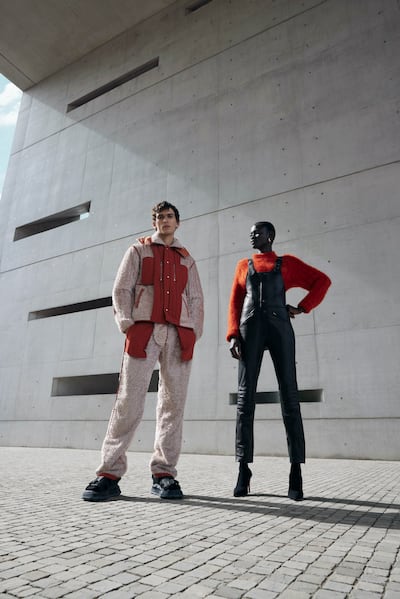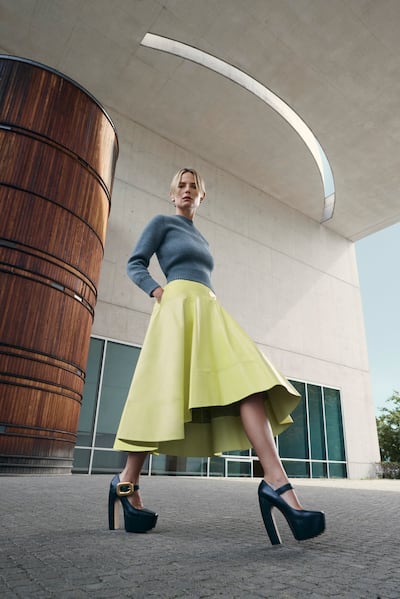
The Business of Fashion
Agenda-setting intelligence, analysis and advice for the global fashion community.

Agenda-setting intelligence, analysis and advice for the global fashion community.

Change is afoot at Matchesfashion.
In the three months since former Asos chief Nick Beighton came aboard as CEO, the British e-tailer has hired new executives across finance, commercial and operations, while Beighton has begun to sketch out a vision to revive the company.
Under new leadership, Matchesfashion is working to revamp its user experience and broaden its offer in an attempt to expand its appeal, notably among young consumers.
“You’ll see Matches going through a transformation,” Beighton, who joined the business in August, told BoF.
ADVERTISEMENT
The executive is the company’s fourth CEO in as many years, and was tasked by Matchesfashion’s owner Apax with restoring growth at the troubled luxury e-tailer whose revenues peaked in 2019. His comments came after Matchesfashion released another set of gloomy financial results for 2021, as the company continued to struggle to navigate Brexit complications, Covid restrictions and a fiercely competitive environment for multi-brand e-tailers.
Sales were flat at £386.6 million ($446.1 million) and losses deepened slightly to £38.6 million for the fiscal year ending January 31, 2022, during which leadership was split between previous CEOs Ajay Kavan (a former Amazon executive who departed after a year in the job) and Paolo de Cesare (the former Printemps CEO who left the company in July after nine months).

Matchesfashion was once a fast-growing, profitable business that was highly regarded for its tight curation and unique point of view. But since a sale in 2017 to private equity firm Apax, which reportedly valued the business at $1 billion, the company has lost its way, struggling to maintain pacey growth and profitability while preserving its trendsetting fashion edit. In addition to competing for customers with larger rivals like Farfetch and Net-a-Porter and more focused e-tailers like Mytheresa, Matchesfashion has also had to increasingly jostle for inventory as many brands’ prioritise their own websites and cut back their exposure to wholesale.
However, since closing the books for 2021 early this year, strong demand in the US and a higher share of full-price sales have helped kickstart revenues, the company said. The company also benefited from transitioning to a hybrid business model that mixes wholesale with e-concessions. In the most recent quarter through October, sales rose by a double-digit percentage year-on-year, Beighton told BoF.
“The recovery is already underway,” he said. “Some of the work and foundations that were already in place before I joined have started to bear fruit.”
Beighton’s first moves as CEO have included bringing on a new chief operating officer from Farfetch, Stuart Hill, and a new chief financial officer, Dave Murray, who previously held roles at Farfetch and Amazon Logistics. Carl Tallents, formerly head of luxury at Frasers Group, has been installed as chief commercial officer, replacing Elizabeth Von Der Goltz, who left in September. More key executive appointments will be made in the coming months, Beighton said.
In terms of his vision for reigniting growth at the company, Beighton says he wants to turn Matchesfashion into a one-stop shop for a broader range of luxury customers — notably attracting more young clients as well as outfitting shoppers for “every moment in our customer’s fashion life.”
Matchesfashion has long done a strong business in occasionwear and vacation dressing, but going forward Beighton also sees opportunity in bolstering adjacent offers like activewear, eventually expanding into categories like beauty, or adding services like resale and rental. Curation will still be critical, but the offering of brands and products available on the site will grow.
ADVERTISEMENT
“We are going to broaden the appeal of Matches to a different demographic, through different experiences, different products and different ways of connecting,” Beighton said

While Beighton has no luxury sector experience, he is well practiced in scaling an e-commerce business profitably. During his 12 year tenure at Asos, where he served as CFO, COO and most recently CEO, revenues grew from £223 million ($254 million) in 2009 to nearly £4 billion ($4.5 billion) in sales last year, with £158.2 million ($180.5 million) in profit.
Streamlining the efficiency of backend operations and improving the user journey will be key to fuelling profitable growth at Matches. Attempts to scale the luxury company’s infrastructure and tech capabilities have proven costly, requiring owner Apax to pump millions of pounds into Matchesfashion over the past few years. Brexit-induced disruptions have also been expensive to navigate, company filings show.
“The [back-end] business…has to be clockwork, has to be seamless, has to be technology-driven, has to be efficient, has to be focused on the customer outcomes,” Beighton said. “Those are fundamental to driving profitability, efficiency and customer satisfaction.”
Matchesfashion is working to turnaround its business against a backdrop of major shifts in the luxury e-commerce sector. In August, Richemont announced a deal with Farfetch to spin-off loss-making Yoox Net-a-Porter, marking significant consolidation in the space. More deals could be on the horizon, as remaining players may look to bolster their market share and reduce backend costs.
“Being a multi-brand fashion and luxury retailer online is very difficult and challenging at the best of times and with the best of strategies,” Bernstein analyst Luca Solca said.
Matchesfashion has proven a costly investment for owner Apax, which after five years could be looking for an exit. Beighton, however, says the fund still believes in the e-tailer’s potential.
“If Apax wanted out, they wouldn’t have gone and hired me and given me free reign to transform the team,” he said. “They’re in for the journey.”
Additional reporting by Lauren Sherman.
Beighton is the fourth CEO to run the luxury e-tailer in less than five years as its private equity owners struggle to improve performance.
The retailer, facing growing pains of its own, is launching a new 'Innovators Programme' to bolster the fledgling labels that help set it apart from competitors in a crowded luxury e-commerce market.
Online luxury retail is now 20 years old. But after two decades of innovation, once-groundbreaking multi-brand giants face significant changes in consumer behaviour — and a growing, diverse stable of competitors — just as the coronavirus epidemic turns the world upside down. What happens now?
A runway show at corporate headquarters underscored how the brand’s nearly decade-long quest to elevate its image — and prices — is finally paying off.
Mining company Anglo American is considering offloading its storied diamond unit. It won’t be an easy sell.
The deal is expected to help tip the company into profit for the first time and has got some speculating whether Beckham may one day eclipse her husband in money-making potential.
The designer has always been an arch perfectionist, a quality that has been central to his success but which clashes with the demands on creative directors today, writes Imran Amed.